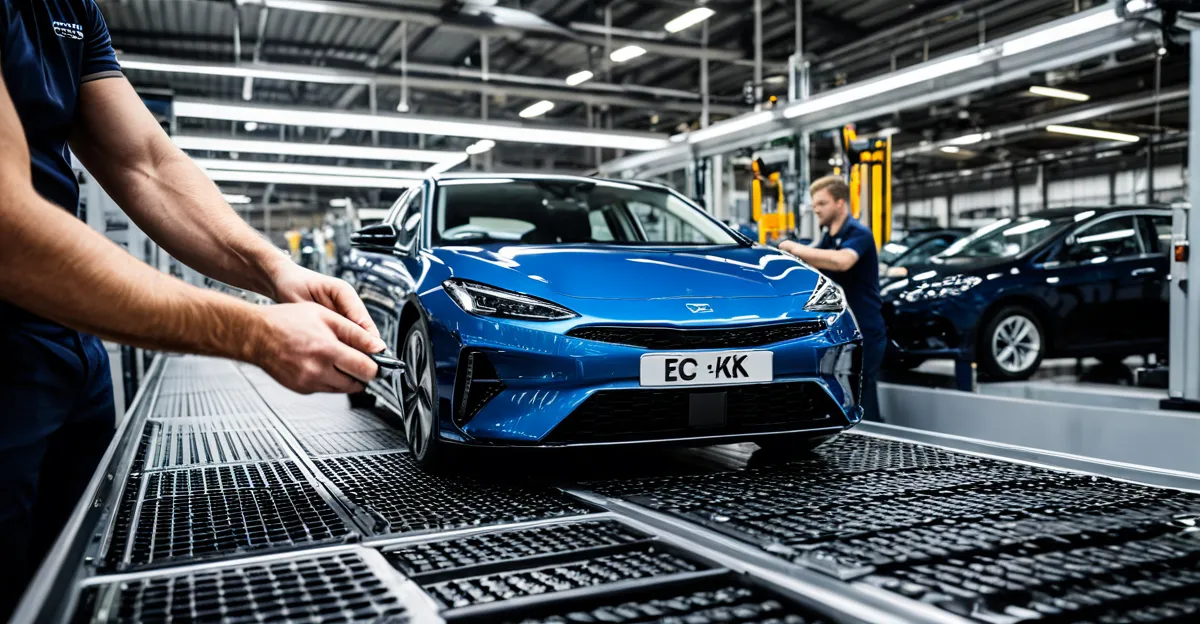Overview of Sustainable Manufacturing in the UK Automotive Industry
Sustainable manufacturing in the UK automotive industry involves designing and producing vehicles with minimal environmental impact. This means integrating environmental responsibility throughout the supply chain, from raw material sourcing to waste management. Sustainable manufacturing is significant because it addresses increasing regulatory pressures and consumer demand for greener products.
Current sustainability trends shaping the UK automotive industry include the shift towards electric vehicle production and the incorporation of renewable materials. Companies are adopting cleaner production methods, focusing on reducing carbon emissions and waste, and increasing resource efficiency. These trends reflect an industry-wide commitment to sustainability, driven by both market forces and governmental policies.
In parallel : How is the UK automotive industry integrating AI into vehicle design?
The impact of sustainability initiatives on automotive business models is profound. Manufacturers are redefining strategies to prioritize eco-friendly innovations, which in turn improves brand reputation and long-term profitability. Moreover, sustainability drives collaboration among suppliers to embed green practices consistently. This transition demonstrates the UK automotive industry’s leading role in embracing sustainable manufacturing, contributing to a more environmentally responsible future while maintaining economic competitiveness.
Strategies and Technologies for Sustainable Production
In the UK automotive industry, production strategies increasingly emphasize sustainability by integrating recycling and circular economy principles. This approach minimizes waste by reusing materials, reducing dependency on virgin resources, and promoting a closed-loop supply chain. Such sustainable processes are central to lowering environmental impact while maintaining productivity.
In parallel : How Will Electric Cars Transform Transportation in the UK?
The adoption of green technology plays a pivotal role in sustainable manufacturing. UK manufacturers prioritize low-carbon materials and alternative composites, like bio-based plastics and lightweight metals, which reduce vehicle emissions throughout their lifecycle. These materials support enhanced energy efficiency and resource conservation without compromising safety or performance.
Energy-efficient processes are another cornerstone. Factories implement advanced automated systems, optimize heating and cooling, and invest in renewable energy sources such as solar and wind. This reduces overall carbon footprints and aligns production with the industry’s commitment to environmental responsibility.
Together, these strategies and technologies form a comprehensive framework for sustainable production in the UK automotive industry by lowering emissions, conserving resources, and fostering innovation. This integrated model enables manufacturers to meet regulatory demands while advancing towards a more eco-friendly future.
Regulatory Framework and Government Incentives
The UK government regulations play a crucial role in shaping sustainable manufacturing within the UK automotive industry. Environmental standards set by authorities require manufacturers to limit emissions, reduce waste, and increase energy efficiency. Compliance with these regulations ensures that production aligns with national climate goals and international agreements.
Tax incentives form an important part of government efforts to promote sustainability. These incentives encourage automakers to invest in green technology and cleaner production methods, lowering operational costs while advancing environmental responsibility. For instance, reduced taxes on electric vehicle components and investments in renewable energy infrastructure motivate manufacturers to adopt sustainable practices.
Automotive sustainability policies at both national and local levels reinforce these regulations. They provide a structured framework that guides companies through evolving sustainability expectations. The policies encourage innovation by supporting research and development focused on low-carbon materials and circular economy models.
Meeting international standards like ISO 14001 further supports UK manufacturers by standardizing environmental management systems. Adherence to these standards not only ensures regulatory compliance but also strengthens the global competitiveness of UK automotive brands. Taken together, the regulatory framework and government incentives create a robust environment for advancing sustainable manufacturing in the UK automotive industry.
Case Studies of Leading UK Automotive Companies
Examining sustainability case studies within the UK automotive industry reveals how top brands implement eco-friendly practices. Leading UK automotive brands have made significant strides by embedding innovation in manufacturing and prioritizing resource efficiency. For example, several companies have reduced carbon emissions dramatically by transitioning to low-carbon materials and optimizing production processes.
Real-world examples highlight measurable outcomes: improvements in recycling rates demonstrate a commitment to sustainable manufacturing and waste reduction. One notable effort involves using circular economy principles to reuse vehicle components, fostering a closed-loop system that diminishes the need for virgin resources. This strategy not only boosts environmental responsibility but also cuts costs over time.
Expert commentary often points to the importance of integrating green technology with production strategies. These initiatives reflect a broader industry trend toward environmental responsibility, influencing business models and competitive positioning. UK automotive brands leading the way set benchmarks by combining sustainability trends with practical implementation, proving that environmental goals and profitability can coexist effectively.
Challenges and Opportunities Ahead
Sustainable manufacturing in the UK automotive industry faces several industry challenges that slow progress. High upfront costs for green technology and energy-efficient machinery can restrict smaller manufacturers. Supply chain complexities create barriers to sourcing consistent, sustainable raw materials, impacting overall environmental responsibility efforts. Additionally, a shortage of skilled workers trained in sustainable processes limits widespread implementation.
However, these barriers present clear innovation opportunities. Advancements in digital manufacturing and AI can optimize production strategies, reducing waste and enhancing energy efficiency. Emerging technologies such as solid-state batteries and hydrogen fuel cells offer promising alternatives to current powertrains, combining sustainability trends with future readiness.
Looking ahead, the future outlook is cautiously optimistic. Collaboration across the UK automotive industry, government, and academia will be critical to overcoming obstacles. Upskilling programs aimed at developing expertise in green technology support the workforce transition. Embracing these opportunities can move sustainable manufacturing from niche initiatives to industry-wide standards, fostering long-term economic and environmental benefits for the UK automotive sector.


